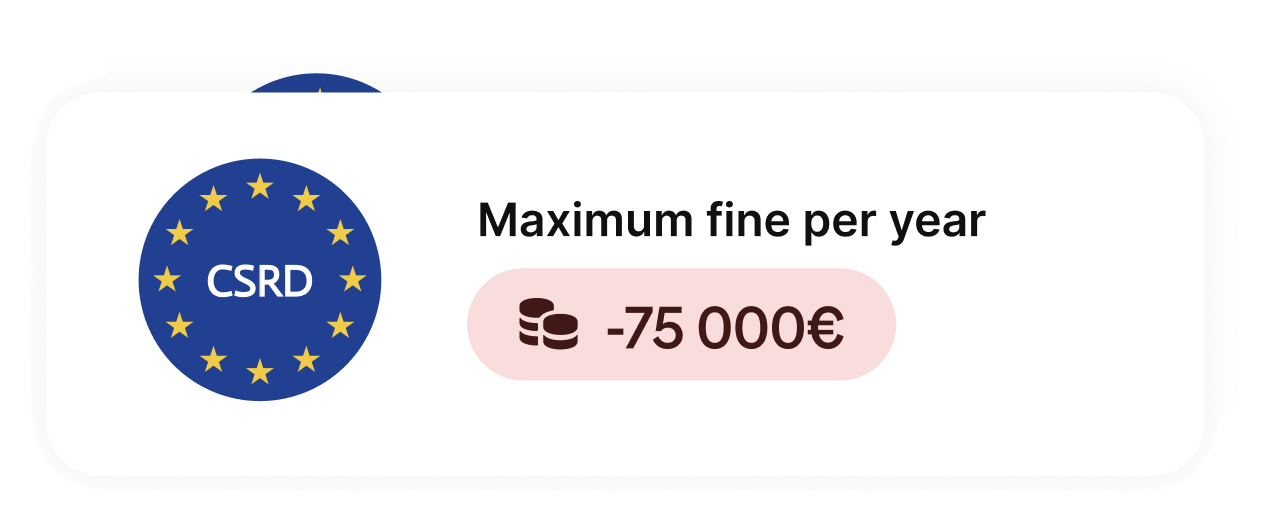ESG Platform
CSRD Reporting:
Simplified for Success.
Take control of your compliance with a platform that turns reporting in a lever for transformative sustainability. Greenly makes managing your CSRD obligations seamless.

Trusted by over 3,500 Ambitious Climate Leaders worldwide.

Built-in EFRAG-Compliant Scoring
Automated industry-specific materiality assessments to ensure full compliance with EFRAG standards.
AI-Driven ESRS Data Collection
Streamline data mapping with AI-guided questions and tools to collect relevant ESRS information effortlessly.
Automated xHTML Reports with XBRL
Export fully compliant reports in xHTML format, complete with XBRL tagging for seamless submission.

Expert Support Every Step
Access Greenly’s CSRD and Climate Experts through trainings, follow-ups, and tools to help you progress with ease.
The Only End-to-End CSRD Solution
With CSRD on the horizon, now’s the time to prepare and avoid wasting hours on compliance. Greenly’s platform offers expert guidance and tailored tools to ensure you're fully prepared.
Quickly check your company’s
requirements regarding CSRD

Cut CSRD Reporting Time From 1000 Hours to Under 100
With CSRD on the horizon, now’s the time to prepare and avoid wasting hours on compliance. Greenly’s platform offers expert guidance and tailored tools to ensure you're fully prepared.
Turn CSRD Compliance
Into Your Competitive Advantage
Deadlines are now. Become compliant to avoid fines.

Future-Proof Your Business,
Master CSRD Compliance Today.
Deadlines are now. Become compliant to avoid fines.

What is the CSRD Directive?
The CSRD, or "Corporate Sustainability Reporting Directive," is a groundbreaking European directive that mandates certain companies to provide annual non-financial reporting.
Its primary goal is to enhance transparency by disclosing comprehensive and reliable information on companies' environmental and social impacts.
- Double Materiality Assessment and Due Diligence
- EU taxonomy system including XBRL tagging
- Governance-related information (management of sustainability risks)
- Mandatory third-party auditing
- Digitalization of sustainability reports in the The European Single Electronic Format (ESEF)
Does it apply to my company?
Following the 2026 Omnibus I simplification package, the CSRD focuses on the largest EU market players, impacting approximately 15,000 companies, including the following:
Companies previously subject to the NFRD
- At least 500 employees
- More than 40 million euros turnover
- More than 25 million euros in the balance sheet
Report by 2025
Based on 2024
Report by 2025
Based on 2024
Large Enterprises
(Both listed and unlisted)
- At least 1,000 employees
- And either: 450 million euros turnover or 25 million euros in the balance sheet
Report by 2026
Based on 2025
Report by 2028
Based on 2027
Small and Medium sized Companies
(European and non-European)
- Listed SMEs are exempt and no longer required to report.
- Protected Status: Companies under 1,000 employees only need to use the Voluntary SME Standard (VSME) if asked for data by large partners.
Report by 2027
Based on 2026
Non-EU Parent Companies
- Over 450 million euros of EU turnover annually for 2 consecutive years
- Must have an EU subsidiary with 1,000+ employees or an EU branch with €200 million+ turnover
Report by 2029
Based on 2028
Report by 2029
Based on 2028
What are the data requirements?
European Sustainability Reporting Standards or ESRS are the essential guidelines for requirements of CSRD reporting. There are cross-cutting standards like ESRS 1 and ESRS 2, and topic-specific standards.
ESRS 1
ESRS 1 consists of the general principles to follow when preparing sustainability reporting.
- Double materiality assessment
- Sustainability due diligence
- Supply and value chain
- Timeline
ESRS 2
ESRS 2 consists of general disclosure and defines the mandatory baseline disclosures regardless of materiality assessment outcomes. The structure for topical standards are also set here:
- Governance: Governance Disclosure Requirements Governance 1-5
- Strategy: SBM 1-3
- Impacts, risks and opportunities - IRO 1-2 (based on Double Materiality Assessment)
- Metrics and targets
Environnement
Social
Governance
Not affected by the CSRD? The VSME is your solution
Your company is not subject to the CSRD, but your largest clients are. Since 2025, they have been required to collect sustainability data from their entire value chain, including you.
The VSME standard, a must-have
- 90% less effort than the full CSRD
- Standardized format recognized by all large companies
- No mandatory audit (unlike the CSRD)
- Competitive advantage: be ready before your competitors

Why act now?
Leaders are preparing while their competitors wait. Within the next 12-18 months, your clients will demand this data. Those who cannot provide it risk being replaced.
With Greenly
- Simplified and guided questionnaire
- VSME report generated in one click
- Comprehensive training and support
- Over 3,500 companies trust us

Still have questions about CSRD?
Have more questions? Check out our complete FAQs in the Knowledge Base to get the answer you’re looking for.
The CSRD is an EU directive that strengthens sustainability reporting requirements on companies’ environmental, social, and governance (ESG) impacts.
The CSRD is phased in from 2024 to 2029. Note: Firms with 500–1,000 employees have a 2-year transition exemption to exit the regime.
The CSRD now targets the largest firms (1,000+ employees). Listed SMEs are exempt, and non-listed SMEs are protected by voluntary reporting caps., check our article about it.
SMEs must prepare to disclose ESG data, monitor their carbon footprint, and assess supplier responsibility.
The CSRD is based on 12 ESRS (European Sustainability Reporting Standards) defined by EFRAG.
Tools like Greenly help collect and structure ESG data, track carbon emissions, and meet CSRD standards easily. Book a demo with our Climate Experts to learn more.
Double materiality means reporting both how sustainability issues affect your business and how your business impacts people and the planet.
The CSRD and EU Taxonomy work together : companies must disclose how their activities align with the taxonomy’s environmental criteria in their ESG reports.
Penalties vary by country but can include fines, reputational damage, or exclusion from public and private tenders due to lack of ESG transparency.





